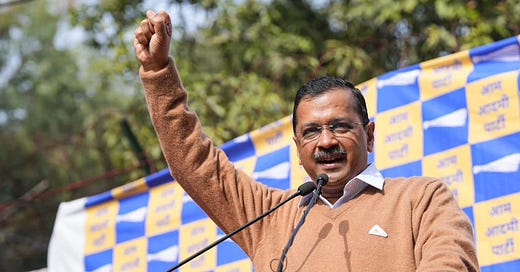Kejriwal's Interim Bail Plea on Medical Grounds Denied: Decision on Regular Bail Today
Kejriwal Denied Interim Bail Amidst Heightened Legal Challenges and Political Setbacks.
Kejriwal Denied Interim Bail on Medical Grounds
A Delhi Special PMLA Court on Wednesday (5th June) rejected the interim bail application of Arvind Kejriwal, the incarcerated Chief Minister of Delhi, on medical grounds. This ruling adds yet another layer of complexity to his ongoing legal battle. The order, passed by Special Judge Kaveri Baweja of the Rouse Avenue Courts, comes amidst Kejriwal's entanglement in a money laundering case related to the alleged Delhi liquor policy scam. As the legal proceedings unfold, Kejriwal's political future appears to be increasingly uncertain, particularly in light of AAP’s recent electoral rout in the 7 Lok Sabha seats in Delhi
This application, along with one for regular bail, had been filed by the defence team a few days prior, on 2nd June, his stipulated surrender date to the jail after a 21-day extraordinary reprieve granted by the Supreme Court.
Diabetes Not Deemed Grounds for Interim Bail
In her ruling, Judge Baweja dismissed Kejriwal's plea for interim bail on medical grounds, emphasizing that not every ailment warrants release on bail. Despite Kejriwal's claims of suffering from diabetes, the Court determined that his condition did not qualify as sufficiently serious to merit the interim relief sought. Moreover, the Court pointed to Kejriwal's extensive election campaigning during the recent Lok Sabha polls as evidence that he is not afflicted by any life-threatening ailment.
Legal Proceedings and Medical Tests
While denying interim bail, the Court directed the Tihar Jail authorities to facilitate the necessary medical tests for Kejriwal as prescribed by an AIIMS medical board. This decision underscores the Court's commitment to ensuring Kejriwal receives appropriate medical attention while in custody. However, it also signifies the Court's reluctance to grant him temporary release, highlighting the gravity of the charges against him.
Senior Advocate N Hariharan and advocate Vivek Jain appeared for Arvind Kejriwal, while Solicitor General Tushar Mehta, Additional Solicitor General SV Raju, and Special Counsel Zoheb Hossain represented the ED.
Political Repercussions
Kejriwal's legal troubles coincide with significant political challenges, particularly within the context of the emerging INDI Alliance, a coalition led by the Congress party, whose challenge to the Modi 3.0 juggernaut eventually petered out into nothing more than a "moral victory". The absence of Kejriwal, a key political figure, from the post-results deliberations of this alliance could have significant implications, especially considering the major electoral setback suffered by the Congress-AAP combine in the 7 Delhi Lok Sabha seats, where they failed to win even a single seat.
Looking Ahead— Regular Bail Unlikely
As Kejriwal awaits the decision on his regular bail plea scheduled for today (June 7), the road ahead remains fraught with uncertainty. Kejriwal's anticipation of a favourable decision on his regular bail application in the Special PMLA Court today appears exceedingly unlikely, given the stringent twin conditions incorporated in Section 45 of the Prevention of Money Laundering Act (PMLA), 2002. The convergence of legal and political obstacles underscores the formidable challenges confronting Kejriwal. Moreover, the steadfast commitment of the judiciary to strictly apply the provisions of the aforementioned law makes the prospect of bail at the level of the trial court rather bleak.
In Summary
Denial of Kejriwal’s interim bail plea on medical grounds represents a significant setback amidst mounting legal and political setbacks. While the Court's decision accentuates the seriousness of the allegations, it also underscores the imperative of ensuring Kejriwal's access to appropriate medical care. As the legal proceedings unfold— including a decision on his regular bail application today— and the political landscape evolves, the fate of one of India's most prominent political figures hangs in the balance, with far-reaching legal implications for both the threshold of arrest under Section 19 of the PMLA, 2002, and the political future of the Government of NCT Delhi.
If you believe this article would interest someone you know, please feel free to share it anonymously (for us), using any medium you prefer. Thank you for considering it!





